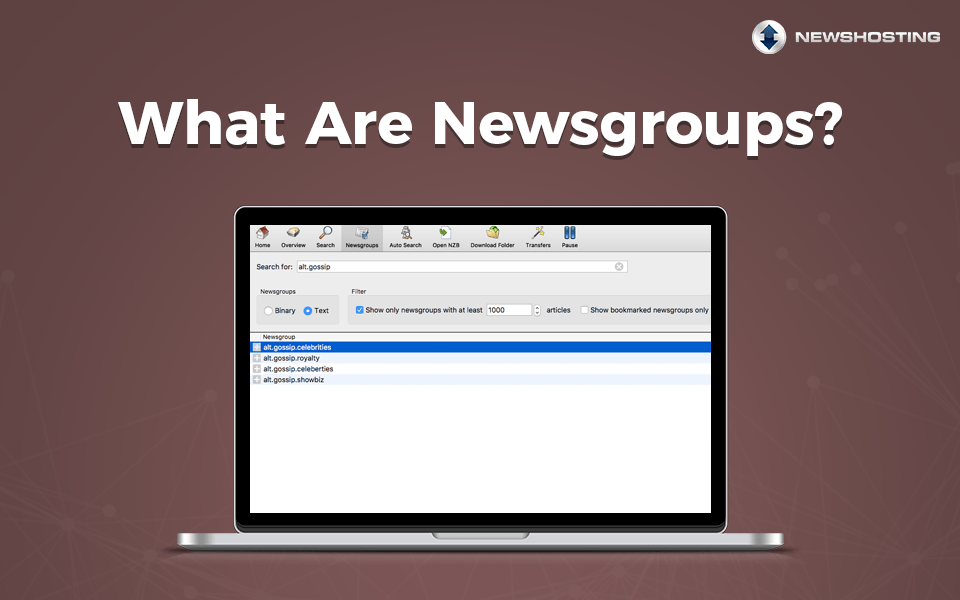While Usenet has a long and interesting history, not everybody understands how it actually works. What started as a simple network between two universities has become a global discussion and file sharing platform. That is an enormous change and the curious can’t help but ask, “How does Usenet work?”
The Idea Behind Usenet
The concept that drives Usenet is to have a stable collection of binary and text articles that can be accessed by anybody with an account. It is unmoderated and relies on local communities to set their own rules about behavior. It is also open to anyone who would like to be a part of it.
Mechanically, Usenet is run on hundreds of servers located around the world. Different companies can run their own servers to affect things like speed and article retention, but ultimately everyone has access to roughly the same Usenet. These servers not only store the information initially, they create several levels of redundancy so that posts don’t get lost to time or hard drive corruption.
The Importance of Article Retention
When comparing Usenet providers, you’ll often see them discuss “article retention.” This is a crucial part of how Usenet works and important for anyone looking to access older posts.
Since Usenet is based on a network of servers, it used to be common for providers to save money by deleting posts after they reached a certain age. However, over time it became clear that maintaining an accurate archive of Usenet posts was a valuable thing to do, so companies started improving their article retention.
Today, Newshosting has the highest article retention rate of any Usenet provider in the world. We currently have 4,661 days, and increase by one day every day so posts on our servers are no longer deleted due to age.
Newsgroups and Nomenclature
Usenet is segmented into several different sub-sections called “newsgroups.” A newsgroup is generally focused on a particular topic, occasionally becoming very specific. The way that newsgroups themselves are grouped is determined by top level hierarchy names.
- alt. – This stands for ‘alternative’. Alt is very much the “miscellaneous” of Usenet top level hierarchy designations, since this is where most things go that don’t fit into any of the rest of the categories. It is by far the most popular designation.
- comp. – this is for topics related to computers and computer science
- humanities. – this focuses on humanities, culture, and the arts, from painting to film
- misc. – Despite there being a miscellaneous designation, this isn’t used as often as alt for random newsgroups. However, some people still post topics that don’t fit other categories here.
- news. – this is for discussions about Usenet. It’s Usenet system news rather than general news from journalists.
- rec. – this is for discussion of recreational activities, leisure, art, culture, relaxation, etc. Unlike humanities, this is more designed for the enjoyment of art rather than discussion of art theory.
- sci. – this designation focuses on science and technology topics
- soc. – this designation is for social topics and can include political discussions
- talk. – this is for general topics that people wish to talk about. It is primarily text posts rather than binary ones.
As you can see, there is a lot of overlap between the categories, and it’s not uncommon to find newsgroups in several top level hierarchy designations about your interests. Fortunately, there are easier ways to find appropriate topics than searching through all 200,000+ newsgroups.
Indexers
A Usenet search engine is called an “indexer.” Unlike the World Wide Web, you can’t just use Google to find Usenet posts. Instead, you can use any number of available indexers that will point you to articles based on your search query.
Indexers can be highly specialized. For example, some only focus on search for binary files. Others might only look for text discussions. Many require you to pay for service, either monthly, annually, or in some cases as a lifetime subscription.
Newshosting has made it a lot easier for you with our newsreader. You can search directly from the Usenet client the same way you would in a normal search engine. Advanced filtering options let you find exactly what you’re looking for on Usenet.
Why Does Usenet Work This Way?
Even from this brief overview, you can see that Usenet is different from the WWW in several important ways. So, how does Usenet work the way it does when people have become used to different standards?
The first and easiest answer is that Usenet was doing it first. Just because other Internet protocols became more popular doesn’t mean that Usenet should necessarily change. We do have a substantial user base that likes things to stay familiar.
Secondly, an Internet protocol is not a speedboat that can turn on a dime. It’s a cargo ship that requires a very long time to change. The last major change to the protocol took over a decade to implement. There are so many changes that need to be made on every level of interaction.
That being said, Usenet has started to adopt some of the more useful conventions from modern online computing. Search and newsreader design are just two examples of how much easier and more intuitive it is to browse Usenet than it was even a few years ago. In the meantime, changes have to be introduced consciously, with an eye toward long-term effects.
See For Yourself
Of course, the best way to understand how something works is by looking at it yourself. Once you sign up for a Usenet account, you’ll see that it doesn’t take much to really understand how Usenet works. Take your time, search for answers, and don’t be afraid to ask for help when you need it. Most importantly: have fun.







